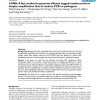Free Online Productivity Tools
i2Speak
i2Symbol
i2OCR
iTex2Img
iWeb2Print
iWeb2Shot
i2Type
iPdf2Split
iPdf2Merge
i2Bopomofo
i2Arabic
i2Style
i2Image
i2PDF
iLatex2Rtf
Sci2ools
BMCBI
2008
2008
LOMA: A fast method to generate efficient tagged-random primers despite amplification bias of random PCR on pathogens
Background: Pathogen detection using DNA microarrays has the potential to become a fast and comprehensive diagnostics tool. However, since pathogen detection chips currently utilize random primers rather than specific primers for the RT-PCR step, bias inherent in random PCR amplification becomes a serious problem that causes large inaccuracies in hybridization signals. Results: In this paper, we study how the efficiency of random PCR amplification affects hybridization signals. We describe a model that predicts the amplification efficiency of a given random primer on a target viral genome. The prediction allows us to filter false-negative probes of the genome that lie in regions of poor random PCR amplification and improves the accuracy of pathogen detection. Subsequently, we propose LOMA, an algorithm to generate random primers that have good amplification efficiency. Wet-lab validation showed that the generated random primers improve the amplification efficiency significantly. Concl...
| Added | 08 Dec 2010 |
| Updated | 08 Dec 2010 |
| Type | Journal |
| Year | 2008 |
| Where | BMCBI |
| Authors | Wah-Heng Lee, Christopher W. Wong, Wan Yee Leong, Lance D. Miller, Wing-Kin Sung |
Comments (0)

